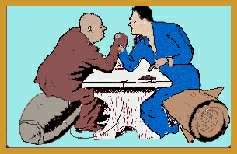|
11. 6 The Cold War Abroad

Exhibit 11.1
The USSR and US leaders battle it out during the
Cold War
With the end of the War, the world was divided
between the capitalist and communist camps. The result was a series
of crises - known as the Cold War.
In 1947, when the British could no longer bear
the strain of supporting Greece and Turkey against probable aggression
from USSR the U.S. entered the scene. The American President Truman,
put forth the Truman Doctrine by which the U.S. took upon
itself the responsibility of providing military aid to countries
which face any threat from the communist camp. In this context,
President Truman submitted the Marshall plan to the Congress in
1947. The plan envisaged economic assistance to European states
ravaged by the World War. Both houses of the Congress adopted the
Economic Recovery Program, popularly known as Marshall Plan in 1948.
The economic aid under the Marshall plan was spent as per the instructions
of an Economic Co-operation Administration headed by Paul
Hoffman.
The Marshall Plan brought about an unbelievable
economic miracle in several countries of Western Europe. By this
plan, the U.S. pumped in money into many West European countries
and Japan whose economies were in shambles after the war.
The tension between East Europe and west Europe,
led to the formation of the NATO or the North Atlantic Treaty
Organization. The members consisted of all North Atlantic, Baltic
and Mediterranean countries who were opposed to the communist countries
of East Europe and USSR. NATO was a military alliance for collective
defense against Russia.
The cold war led to the long protracted War
in Vietnam and the War in Korea.
[Next Page]
|